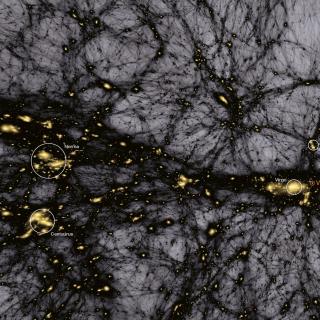Bibcode
Wang, Bao; Wei, Jun-Jie; Wu, Xue-Feng; López-Corredoira, Martín
Referencia bibliográfica
Journal of Cosmology and Astroparticle Physics
Fecha de publicación:
9
2023
Número de citas
9
Número de citas referidas
4
Descripción
Fast radio bursts (FRBs) have been suggested as an excellent celestial laboratory for testing the zero-mass hypothesis of the photon. In this work, we use the dispersion measure (DM)-redshift measurements of 23 localized FRBs to revisit the photon rest mass mγ . As an improvement over previous studies, here we take into account the more realistic probability distributions of DMs contributed by the FRB host galaxy and intergalactic medium (IGM) from the IllustrisTNG simulation. To better account for the systematic uncertainty induced by the choices of priors of cosmological parameters, we also combine the FRB data with the cosmic microwave background data, the baryon acoustic oscillation data, and type Ia supernova data to constrain the cosmological parameters and mγ simultaneously. We derive a new upper limit of mγ ≤ 3.8 × 10-51 kg, or equivalently mγ ≤ 2.1 × 10-15 eV/c2 (mγ ≤ 7.2 × 10-51 kg, or equivalently mγ ≤ 4.0 × 10-15 eV/c2) at 1σ (2σ) confidence level. Meanwhile, our analysis can also lead to a reasonable estimation for the IGM baryon fraction f IGM = 0.873+0.061 -0.050. With the number increment of localized FRBs, the constraints on both mγ and f IGM will be further improved. A caveat of constraining mγ within the context of the standard ΛCDM cosmological model is also discussed.
Proyectos relacionados

Cosmología con Trazadores de la Estructura a Gran Escala del Universo
El Fondo Cósmico de Microondas (FCM) contiene la información estadística de las semillas primigenias que han dado lugar a la formación de todas las estructuras en el Universo. Su contrapartida natural en el Universo local es la distribución de las galaxias que surgen como resultado del crecimiento gravitatorio de aquellas fluctuaciones de densidad
FRANCISCO SHU
KITAURA JOYANES